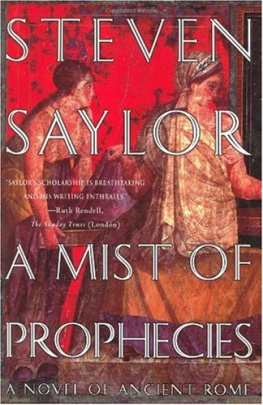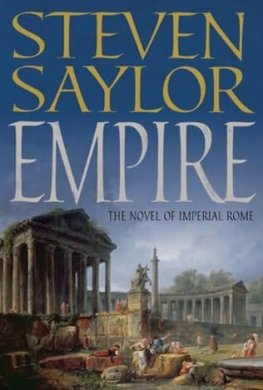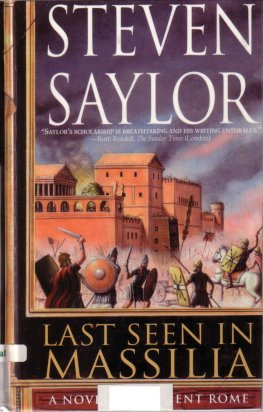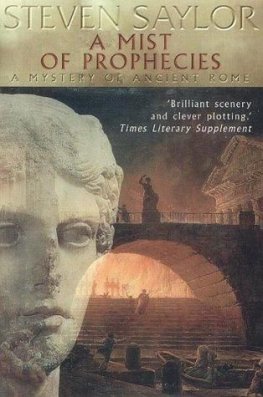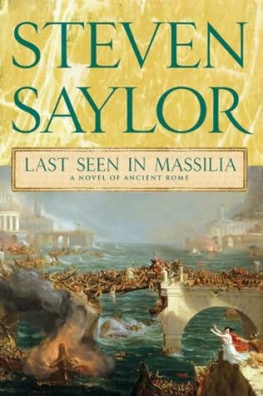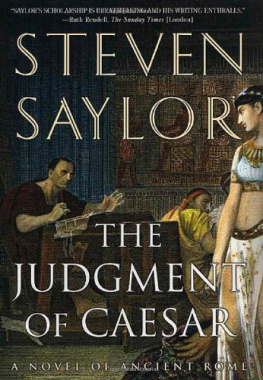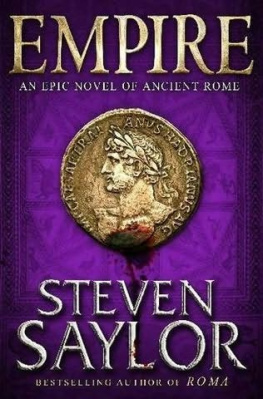Steven Saylor - A Mist of Prophecies (Novels of Ancient Rome)
Here you can read online Steven Saylor - A Mist of Prophecies (Novels of Ancient Rome) full text of the book (entire story) in english for free. Download pdf and epub, get meaning, cover and reviews about this ebook. year: 2003, publisher: St. Martins Press, genre: History. Description of the work, (preface) as well as reviews are available. Best literature library LitArk.com created for fans of good reading and offers a wide selection of genres:
Romance novel
Science fiction
Adventure
Detective
Science
History
Home and family
Prose
Art
Politics
Computer
Non-fiction
Religion
Business
Children
Humor
Choose a favorite category and find really read worthwhile books. Enjoy immersion in the world of imagination, feel the emotions of the characters or learn something new for yourself, make an fascinating discovery.
- Book:A Mist of Prophecies (Novels of Ancient Rome)
- Author:
- Publisher:St. Martins Press
- Genre:
- Year:2003
- Rating:5 / 5
- Favourites:Add to favourites
- Your mark:
- 100
- 1
- 2
- 3
- 4
- 5
A Mist of Prophecies (Novels of Ancient Rome): summary, description and annotation
We offer to read an annotation, description, summary or preface (depends on what the author of the book "A Mist of Prophecies (Novels of Ancient Rome)" wrote himself). If you haven't found the necessary information about the book — write in the comments, we will try to find it.
A Mist of Prophecies (Novels of Ancient Rome) — read online for free the complete book (whole text) full work
Below is the text of the book, divided by pages. System saving the place of the last page read, allows you to conveniently read the book "A Mist of Prophecies (Novels of Ancient Rome)" online for free, without having to search again every time where you left off. Put a bookmark, and you can go to the page where you finished reading at any time.
Font size:
Interval:
Bookmark:
As I can place the first time I saw Cassandra, because on that day word reached Rome of Caesar's successful sea crossing, so I can place the second time I saw her and the first time I actually spoke to her, because of something significant that occurred on the same day. It was on the morning in late Februarius that Marcus Caelius set up a tribunal next to that of the city praetor Trebonius and commenced his campaign to flout Caesar's will and become the radical champion of Rome's downtrodden.
Before he left Rome, Caesar, by proclaiming edicts and bending the will of the Senate, had set in place a program to shore up the faltering Roman economy. The problems were many and daunting. With the commencement of the war, money had grown increasingly scarce even while prices soared. The treasury of Rome had been emptied to pay for Caesar's military campaigns. No taxes were flowing in. Pompey had cut off all revenues from the East as well as vital grain shipments from Egypt. Commerce was at a standstill; ships, horses, and even handcarts had been commandeered for the war effort. Tradesmen were in distress because no money was in circulation. Free laborers were unable to find employment. Hungry slaves were growing restive. Shopkeepers and tenants were unable to pay their rents. Families whose heads of household had fled Italy or joined Caesar's legions were being cheated by the bailiffs left to mind their masters' property. Bankers were demanding payment of old loans and refusing to make new ones. Unscrupulous profiteers were squeezing all they could from the anxious people of Rome.
I myself had gone increasingly into debt for the first time in my life. It seemed that only a handful of people had money, and that they had a great deal of it, and that the rest of us had to go to them begging for loans at whatever terms they demanded. Simply to pay for the daily expenses of life, I found myself indebted to the wealthy banker Volumnius to such an extent that I despaired of ever being able to repay him.
To address these problems, Caesar had ordered that all property values and rents should be rolled back to prewar prices. Debtors were allowed to deduct all interest paid from the principal they owed. Arbitrators were appointed to settle disputes over valuations and bankruptcies. An antihoarding law decreed that no one could keep more than sixty thousand sesterces of gold or silver out of circulation.
Caesar's efforts had been moderate and were moderately successful. Money began to circulate. Shops reopened, and vendors reappeared in the markets. The growing sense of panic among the general population began to subside and gave way to a grinding, day-to-day scrabble for sustenance.
There were those-some because they truly despised the status quo and wanted to see it overturned, and some because they themselves were hopelessly in debt and were desperate for a way out-who had hoped Caesar would enact a far more radical program. They wanted him to abolish all debts, refund rents, perhaps even confiscate the property of the wealthy and redistribute it to the poor. These people were bitterly disappointed.
The man whom Caesar had appointed to administer his economic program was Gaius Trebonius. I had met Trebonius the previous year in the Roman encampment outside Massilia, where he was the commanding officer in charge of the siege. He was a thoroughly competent and resourceful military man with a good head for figures and an intuitive sense of how the world works. Trebonius could look at a catapult and tell you why it wasn't working properly, calculate the load and trajectory, then watch the men loading it and pick the one best suited to give orders to the others. He had conducted an efficient and successful siege, and Massilia had been subdued at very little cost to Caesar's legions. In recognition of his competence, Trebonius was the man Caesar put in place to run the city of Rome in his absence.
Some called Trebonius's magistracy a reward for services rendered, but it was not a job I would have wanted. No doubt Trebonius was able to profit immensely by accepting bribes from the disputants who came before him, but I found it mind-numbing to imagine the endless caseload of property valuations and bankruptcy negotiations over which Trebonius had to preside.
Trebonius conducted this tedious business from a tribunal, a raised platform, in the Forum. He sat on his official chair of state, a particularly ornate specimen in the traditional shape of a folding camp stool but heavily decorated with ivory and gold, with four elephant tusks for legs. Secretaries and clerks hovered about him, fetching documents, consulting ledgers, and taking notes. On most days a long line of litigants awaiting their interview with Trebonius wound snakelike through the Forum. Among the contesting parties, tempers were short, and stakes were high. Not infrequently, fights broke out up and down the line. Armed guards would rush to quell these disturbances before they could expand into a full-scale riot.
It was on a morning in late Februarius that another magistrate, Marcus Caelius, strode into the Forum, carrying his own chair of state and attended by his own retinue of secretaries and clerks, who quickly erected a raised platform only a short distance away from that of Trebonius. Caelius mounted the tribunal and, with a flourish, unfolded his chair of state, which was a notably simpler affair than that of Trebonius-the ivory decorations were less ornate and without gold accents, and the legs were not of ivory but merely of wood carved in the shape of elephant tusks. By the example of his chair of state, Caelius was already proclaiming himself the standard-bearer of austere Roman virtue and the champion of the downtrodden.
Still in his thirties, slender as a youth, and as handsome and charming as ever, Marcus Caelius already had a long and checkered career in public life. I remembered him best as Cicero's unruly young protege, learning the arts of rhetoric at the feet of his prim and proper master by day, carousing and carrying on a debauched social life by night-much to the chagrin of all concerned, especially when Caelius found himself dragged into the courts by his ex-lover Clodia, who accused him of the murder-for-hire of a visiting Alexandrian philosopher. Cicero rushed to his protege's defense. The trial degenerated into a squalid exchange of name-calling, and ultimately Cicero managed to turn the tables on Clodia by picturing her as a wanton, incestuous whore out to ruin an innocent young man. Acquitted, Caelius had turned his back on the alluring Clodia, her rabblerousing brother Clodius, and the rest of their radical clique and had committed himself wholeheartedly to the cause of the so-called Best People, like Cicero and Pompey, until-tugged back and forth like all the other bright, ambitious young men of Rome-he finally cast his lot with Caesar. On the eve of Caesar's decision to cross the Rubicon and commit himself to civil war, Caelius had ridden out of Rome to join him-leaving Cicero once again much chagrined.
Caelius became one of Caesar's lieutenants and served him well in the Spanish campaign. Returning to Rome saddled with debts, he had hoped to be installed in the lucrative post of city praetor, and made no secret of his bitter disappointment when that magistracy had gone instead to Gaius Trebonius. Caelius had been stuck with a lesser praetorship, which put him in charge of adjudicating the affairs of foreign residents in the city. Perhaps Caesar thought it wise to tuck an ambitious fellow of shifting loyalties like Caelius in a safe niche, giving him a job of minimal importance with not much to do-but Caesar should have known that Caelius, with time on his hands, was a dangerous man.
I happened to be in the Forum along with Hieronymus and the usual chin-waggers when Caelius set up his mock tribunal next to that of Trebonius. I also happened to see the look of consternation on Trebonius's face.
Font size:
Interval:
Bookmark:
Similar books «A Mist of Prophecies (Novels of Ancient Rome)»
Look at similar books to A Mist of Prophecies (Novels of Ancient Rome). We have selected literature similar in name and meaning in the hope of providing readers with more options to find new, interesting, not yet read works.
Discussion, reviews of the book A Mist of Prophecies (Novels of Ancient Rome) and just readers' own opinions. Leave your comments, write what you think about the work, its meaning or the main characters. Specify what exactly you liked and what you didn't like, and why you think so.

